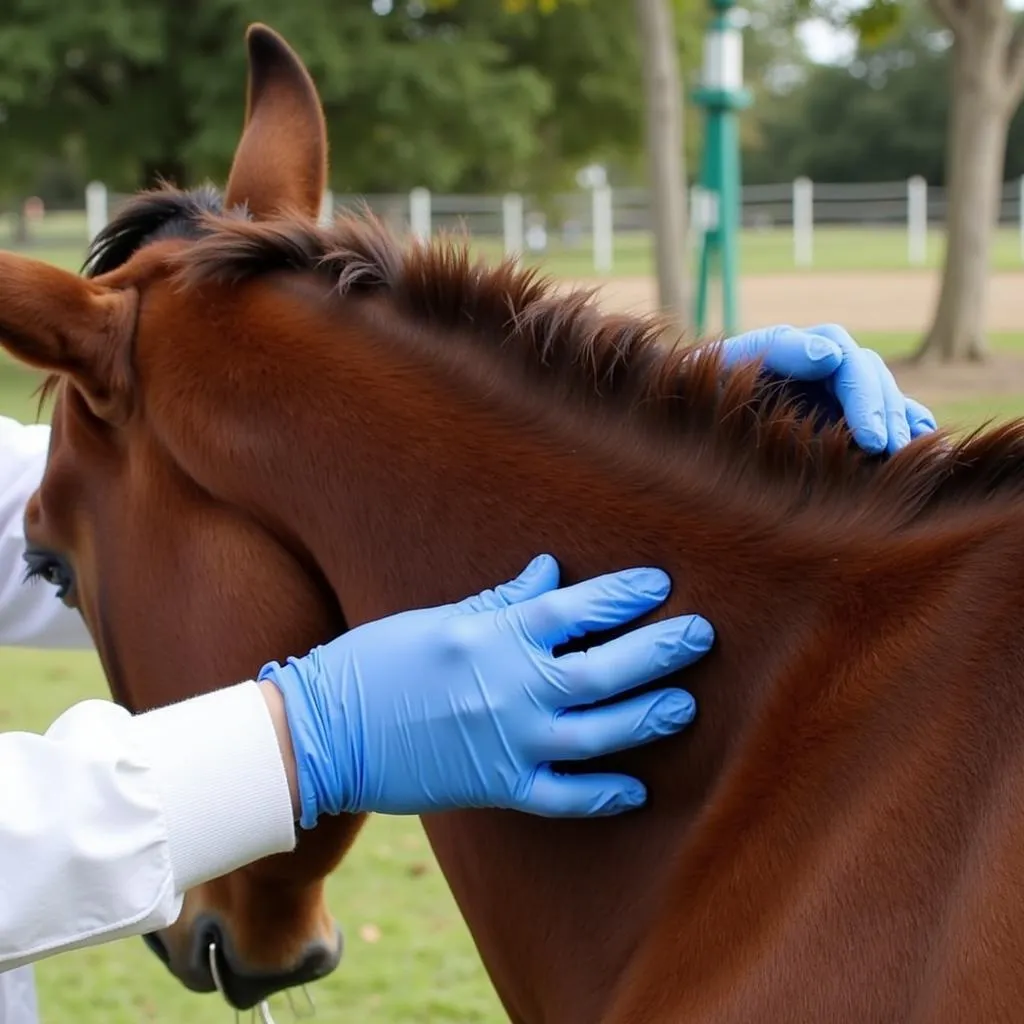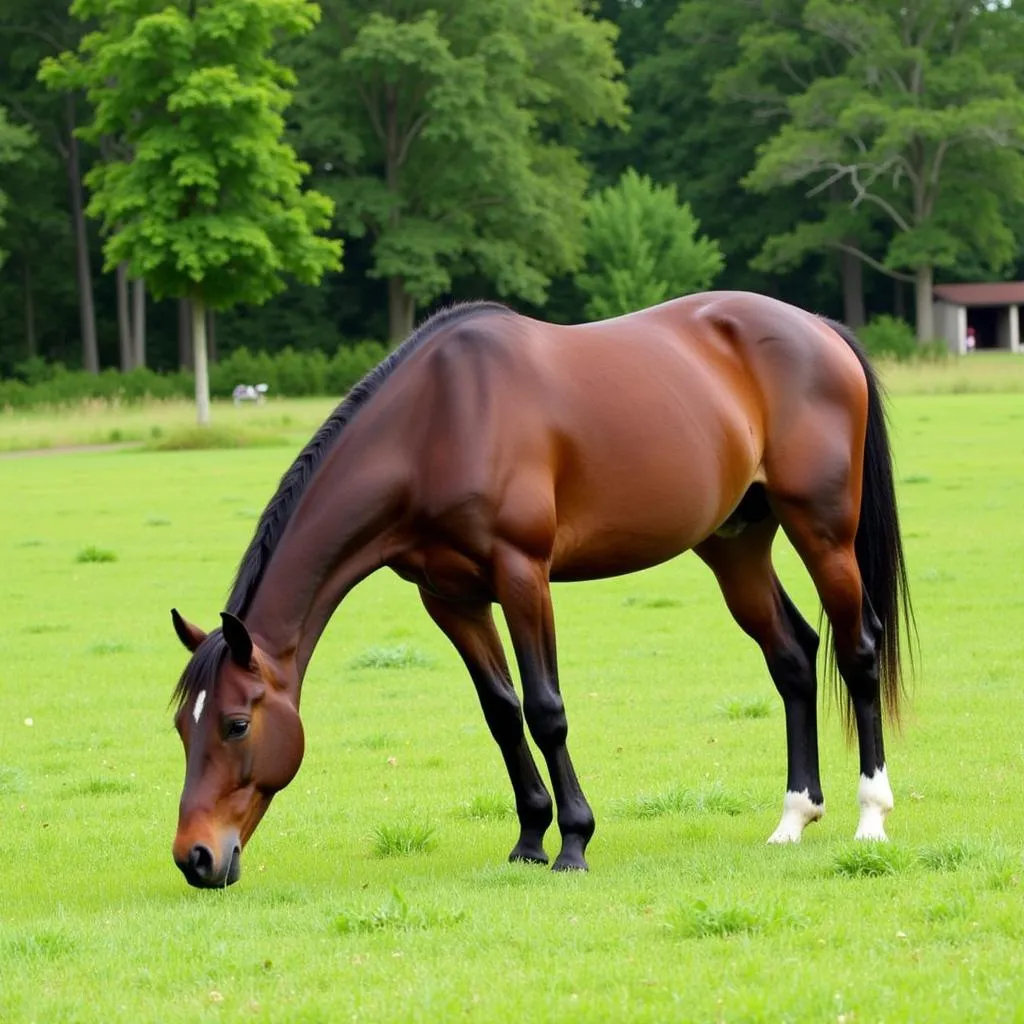Neck threadworms in horses, while not as commonly discussed as other equine parasites, are a concern that requires attention. These internal parasites, scientifically known as Onchocerca cervicalis, can cause a range of health issues for your equine companion. This comprehensive guide will delve into the details of neck threadworms in horses, providing you with the knowledge to identify, treat, and prevent infestations.
Understanding Neck Threadworms in Horses
Neck threadworms are a type of filarial worm that reside in the nuchal ligament of horses. The nuchal ligament is a strong, fibrous band that runs along the horse’s neck, supporting the head and neck. Adult female worms lay microscopic larvae called microfilariae, which migrate through the horse’s tissue and concentrate in the skin.
These microfilariae are then ingested by biting midges, also known as “no-see-ums,” which act as intermediate hosts. When the infected midge bites another horse, the larvae are transmitted, perpetuating the cycle.
Symptoms of Neck Threadworms in Horses
Recognizing the signs of neck threadworms is crucial for timely intervention. While some horses may not show any outward symptoms, others can experience:
- Itching and rubbing: This is often the most noticeable symptom, with horses excessively rubbing their mane, tail, chest, and belly.
- Hair loss: Constant rubbing can lead to patchy or complete hair loss in affected areas.
- Skin lesions: Scratching can cause open sores, scabs, and secondary bacterial infections.
- Sensitivity to light: Some horses might display sensitivity to sunlight, seeking shade or keeping their heads low.
- Eye problems: In some cases, neck threadworms can migrate to the eye area, causing inflammation, tearing, and even blindness.
Diagnosing Neck Threadworms in Horses
If you suspect your horse might have neck threadworms, consult your veterinarian. They will perform a thorough physical examination and may recommend one or more of the following diagnostic tests:
- Skin biopsy: A small skin sample is examined microscopically for the presence of microfilariae.
- Blood tests: While not always definitive, blood tests can detect antibodies to the parasite.
- Response to treatment: In some cases, a presumptive diagnosis is made based on the horse’s positive response to deworming medication.
 Veterinarian examining a horse for neck threadworms
Veterinarian examining a horse for neck threadworms
Treatment of Neck Threadworms in Horses
While completely eradicating adult neck threadworms can be challenging, the primary focus of treatment is to control the microfilariae population and alleviate the horse’s discomfort.
- Ivermectin: This is the most common and effective medication for treating neck threadworms. It is usually administered as an injection and may need to be repeated at specific intervals as recommended by your veterinarian.
- Moxidectin: Another effective medication for neck threadworm control, moxidectin is also administered as an injection.
- Supportive care: Depending on the severity of the infestation, supportive care such as topical anti-itch creams, medicated shampoos, and antibiotics for secondary infections might be necessary.
Preventing Neck Threadworms in Horses
Preventing neck threadworm infestations requires a multi-pronged approach:
- Regular deworming: Follow your veterinarian’s recommended deworming schedule, which typically involves ivermectin or moxidectin treatments.
- Midge control: Utilize insect repellents, stable fans, and screens to minimize midge exposure, particularly during peak seasons.
- Pasture management: Regularly mow pastures and remove manure to discourage midge breeding grounds.
- Early detection: Regularly inspect your horse for any signs of itching, hair loss, or skin irritation. Early detection and treatment can help prevent more severe infestations.
Living with Neck Threadworms in Horses
While neck threadworms can be a persistent issue, with proper management and veterinary care, horses can live relatively normal lives.
“It’s crucial to remember that every horse is different,” states Dr. Emily Carter, DVM, an equine parasitologist at the University of California, Davis. “Some horses may require more frequent deworming or supportive care depending on their individual susceptibility and environmental factors.”
 Healthy horse grazing in pasture
Healthy horse grazing in pasture
Conclusion
Neck threadworms in horses can be a nuisance, causing discomfort and skin irritation. However, by understanding the parasite’s lifecycle, recognizing the symptoms, and implementing appropriate treatment and prevention strategies, you can effectively manage this equine health concern. Remember, regular communication with your veterinarian is key to ensuring your horse’s well-being.
FAQs about Neck Threadworms in Horses
1. Can humans get neck threadworms from horses?
No, neck threadworms are species-specific, meaning they only infect horses and cannot be transmitted to humans.
2. Are neck threadworms seasonal?
Yes, neck threadworm transmission is more common during warmer months when biting midges are most active.
3. Can neck threadworms be cured completely?
While eliminating all adult worms can be difficult, consistent deworming and management strategies can effectively control infestations and minimize symptoms.
Need More Information?
For further assistance with your horse’s health or to learn more about neck threadworms, please contact us at:
Phone: 0772127271
Email: [email protected]
Address: QGM2+WX2, Vị Trung, Vị Thuỷ, Hậu Giang, Việt Nam
Our dedicated team at Justus Horses USA is available 24/7 to answer your questions and provide expert advice.